A merchant bank is historically a bank dealing in commercial loans and investment. In modern British usage it is the same as an investment bank. Merchant banks were the first modern banks and evolved from medieval merchants who traded in commodities, particularly cloth merchants. Historically, merchant banks' purpose was to facilitate and/or finance production and trade of commodities, hence the name "merchant". Few banks today restrict their activities to such a narrow scope.
Merck refers primarily to the German Merck family and three companies founded by the family, including:

M.M.Warburg & CO KGaA is a German private bank, based in Hamburg. A family-owned bank, it was founded in 1798 by Banca Levi Kahana of Warburg and brothers Moses Marcus Warburg and Gerson Warburg, two members of the Warburg family. The Warburg family still owns the bank, continuing a more than 200-year legacy of private ownership.

Commerzbank AG is a major German bank operating as a universal bank, headquartered in Frankfurt am Main. In the 2019 financial year, the bank was the second largest in Germany by the total value of its balance sheet. Founded in 1870 in Hamburg, the bank is today present in more than 50 countries around the world and provides almost a third of Germany's trade finance. In 2017, it handled 13 million customers in Germany and 5 million customers in Central and Eastern Europe. Commerzbank is a member of the Cash Group. 15% of the shares are owned by the Federal Republic of Germany and 85% are in free float.
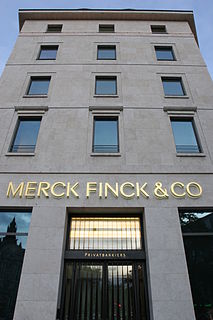
The private bank Merck Finck Privatbankiers AG, founded in 1870, is based in Munich and is also represented nationwide with a total of 16 locations. Since 2011, it has been a subsidiary of the Luxembourg bank KBL European Private Bankers (KLB), which was renamed Quintet Private Bank in January 2020.

The Merck family is a German family of industrialists and bankers, known for establishing the world's oldest pharmaceutical company Merck, its American former subsidiary Merck & Co. (MSD), which is now an independent company, as well as the Hamburg merchant bank H. J. Merck & Co. The family still owns the majority of the pharmaceutical company Merck.
The Industrielleneingabe was a petition signed by 19 representatives of industry, finance, and agriculture on November 19, 1932 that requested for German President Paul von Hindenburg to make Adolf Hitler the German Chancellor.
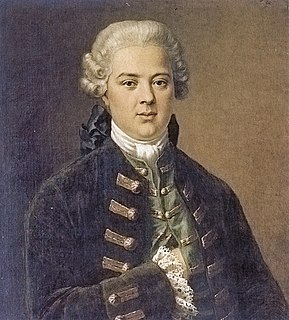
The Hanseaten is a collective term for the hierarchy group consisting of elite individuals and families of prestigious rank who constituted the ruling class of the free imperial city of Hamburg, conjointly with the equal First Families of the free imperial cities Bremen and Lübeck. The members of these First Families were the persons in possession of hereditary grand burghership of these cities, including the mayors, the senators, joint diplomats and the senior pastors. Hanseaten refers specifically to the ruling families of Hamburg, Lübeck and Bremen, but more broadly, this group is also referred to as patricians along with similar social groups elsewhere in continental Europe.

Joh. Berenberg, Gossler & Co. KG, commonly known as Berenberg Bank and also branded as simply Berenberg, is a multinational full-service investment bank based in Hamburg, Germany.

Johann Cesar Godeffroy was a German trader, blackbirder and Hanseat.
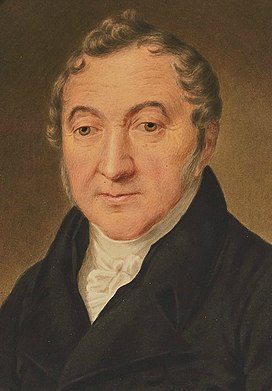
Ludwig Erdwin Seyler was a German banker, merchant and politician. He was by marriage a member of the Hanseatic Berenberg banking dynasty, and was a partner in the Hamburg firm Joh. Berenberg, Gossler & Co. for 48 years (1788–1836), for 46 years as the company's senior partner. The "Co." part of the company name refers to him. Seyler was one of the first merchants and bankers from modern Germany to establish trade relations with the United States and East Asia. He served as a member of the government of Hamburg during the Napoleonic Wars and later as the President of the Commercial Deputation, one of the city-state's main political bodies, and as a member of the Hamburg Parliament. Ludwig Seyler was a son of the Swiss-born theatre director Abel Seyler and a son-in-law of the bankers Johann Hinrich Gossler and Elisabeth Berenberg through his marriage to their eldest daughter Anna Henriette Gossler.

Johann Hinrich Gossler was a German banker and grand burgher of Hamburg, a member of the Hanseatic Berenberg/Gossler banking dynasty and the owner and head of the firm Joh. Berenberg, Gossler & Co.. He was married to Elisabeth Berenberg (1749–1822), the only heir of the Berenberg banking family. The Gossler Islands in Antarctica are named in honour of his family.

The Berenberg family was a Flemish-origined Hanseatic family of merchants, bankers and senators in Hamburg, with branches in London, Livorno and other European cities. The family was descended from the brothers Hans and Paul Berenberg from Antwerp, who came as Protestant refugees to the city-republic of Hamburg following the Fall of Antwerp in 1585 and who established what is now Berenberg Bank in Hamburg in 1590. The Berenbergs were originally cloth merchants and became involved in merchant banking in the 17th century. Having existed continuously since 1590, Berenberg Bank is the world's oldest surviving merchant bank.
The Seyler family is a Swiss family, originally a patrician family from Liestal near Basel. Family members served as councillors and Schultheißen of Liestal from the 15th century, later also as members of the Grand Council of Basel. A Hamburg branch descended from the banker and renowned theatre director Abel Seyler became by marriage a part of the Berenberg banking dynasty, co-owners of Berenberg Bank and part of Hamburg's ruling class of Hanseaten.
The Norddeutsche Bank was a German bank that existed from 1856 to 1929. It was established by Berenberg Bank, H.J. Merck & Co. and the bank house of Salomon Heine and private founders such as Robert Kayser as the first joint-stock bank in northern Germany, becoming the largest bank in Hamburg. In 1895 it was merged with the Disconto-Gesellschaft, but the two banks continued to operate separately. In 1929 both the Norddeutsche Bank and the Disconto-Gesellschaft were merged into Deutsche Bank.

Elisabeth Berenberg was a Hamburg heiress, merchant banker and a member of the Berenberg family. She was the last male line member of the Flemish-origined Hanseatic Berenberg banking family in Hamburg, and ancestral mother of the von Berenberg-Gossler family, the current owners of Berenberg Bank. She is also noted as the only woman ever to serve as a partner and take an active leadership role (1790–1800) at Berenberg Bank since the company was established in 1590 by her family.
The following is a timeline of the history of the city of Hamburg, Germany.
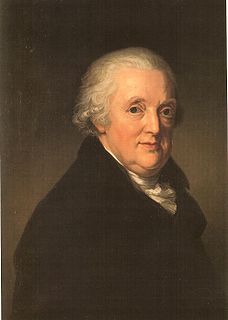
The Schröder family is a Hanseatic family of Hamburg, that is, a family that belonged to the historical ruling class of grand burghers of the city republic prior to the constitutional changes in 1918–19. The Schröder family has traditionally been Lutheran.
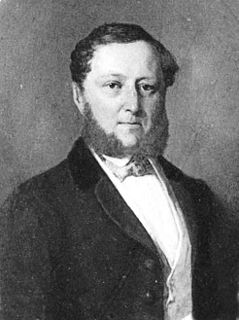
Carl Hermann Merck was one of the leading Hamburg statesmen of the 19th century, holding the office of Syndicus from 1847 until his death in 1880.
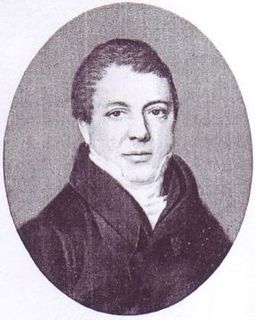
Karl Sieveking, born 1 November 1787 in Hamburg, died 30 June 30 1847, was a Syndicus of Hamburg, diplomat, politician, patron of the arts and philanthropist. The four syndics sat in the Senate with the senators and took part in the debates, but had no vote. The office, at that time, was somewhat analogous to that of a cabinet minister. To them were entrusted all important negotiations, and the preparation of every legislative enactment. A syndicus ranked between a mayor and a senator and had the title "Magnificence". Sieveking was one of the most influential figures in Hamburg in the first half of the 19th century. Among the many traces he left behind in his hometown include the Rauhes Haus, the Kunstverein and the former country estate Hammer Park.












